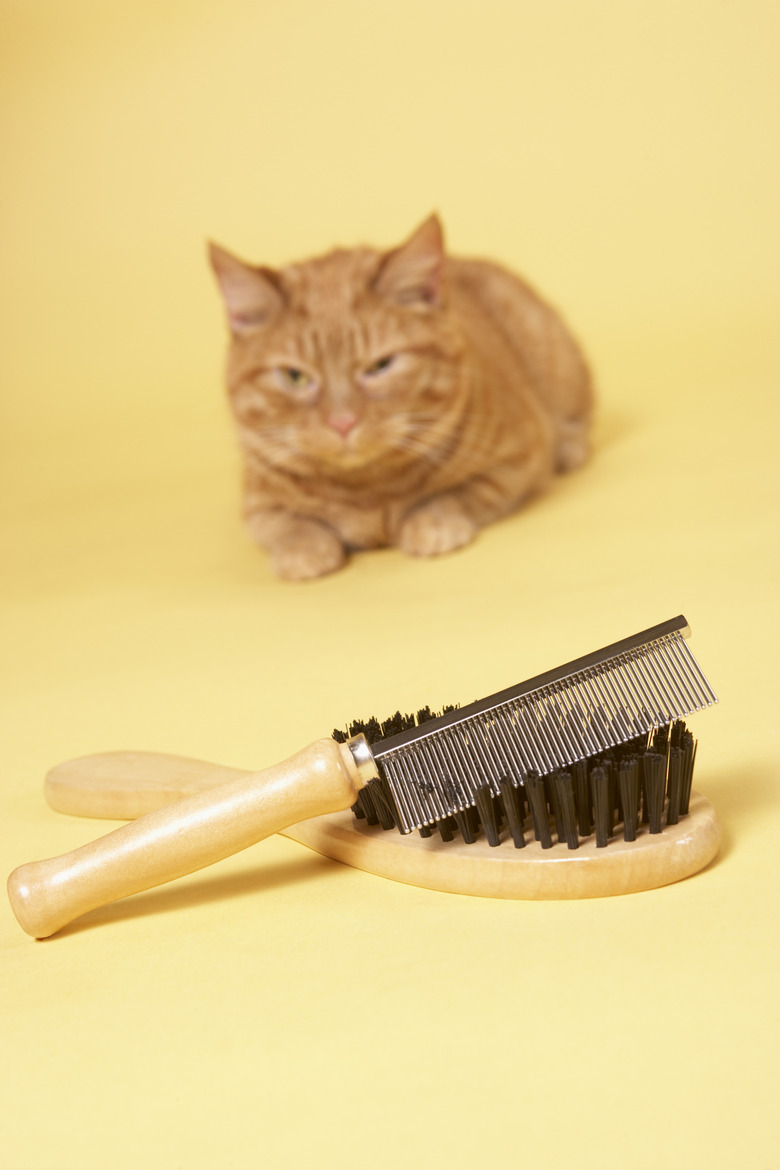Homemade Cat Hairball Remedy
Hairballs are often the punchline of jokes when it comes to cats, but these indigestible masses of fur can sometimes cause major health issues for your pet. When felines ingest too much hair while cleaning themselves, they can develop intestinal issues, like hairballs, which are scientifically known as trichobezoars. These can lead to complications in felines. The best cat hairball remedy to curb this issue is regular brushing to remove loose hair, but there are other things you can give your cat to ease his digestion of fur.
At-home remedies can be prepared using simple ingredients you may already have on hand. Cabinet staples, like pure pumpkin, moist seafood, or small amounts of mild food oils, can help keep things moving in your cat's digestive system. There are also store-bought treatments available. Always consult your veterinarian before giving your cat new food, supplements, or hairball medicine.
The importance of brushing cats
The importance of brushing cats
Whether you have a short- or long-haired feline, regular brushing is a very important part of reducing your cat's hairballs. Contrary to their name, these clumps of fur are actually cigar shaped, and cats are not able to digest them.
All cats consume a large amount of loose hair while grooming, and since they are meticulous in their bathing, cats take in fur often. This can be rough on their digestive system, leading to hairballs, constipation, and sometimes even intestinal blockages. Since hair cannot be digested, it either comes back up through the throat by coughing, passes with feces, or gets stuck in a large clump somewhere in the digestive tract.
By brushing your cat regularly, you can reduce the amount of hair she ingests during grooming sessions. Make a point to groom your cat on a daily basis. Choose a soft brush for shorter fur. If your cat has a medium to long coat, a wire brush will be more effective at removing loose fur that can contribute to hairballs.
Foods that reduce hairballs
Foods that reduce hairballs
Hairball treatment for cats can be as simple as making small adjustments to their diet and water intake. Increasing the amount of fluids your cat consumes is a good step in helping reduce your cat's hairball issues, and it benefits his overall health. More liquid in the form of canned food or a water fountain to encourage more hydration will aid your feline's digestion. In turn, this will assist hair strands in their passage through your cat's body.
Safflower oil or a little bit of oily fish, such as tuna in oil or canned sardines, can help lubricate your pet's digestive tract to aid in digestion. Cooking oils can be given in small amounts. Choosing foods with high levels of fiber will also help reduce hairballs in cats. Pumpkin, a natural hairball remedy for cats, can be added to wet food in small amounts that may not be as noticeable to picky cats. Cats enjoy cat grass, and this is another good source of fiber for felines.
Commercial hairball treatment for cats
Commercial hairball treatment for cats
Stores sell special treats and supplements that are formulated to reduce hairballs. Hairball paste for cats, such as Laxatone, is a mild laxative that can help your cat pass hairballs through his bowel movements to prevent vomiting and lower the chance of a blockage. There are also liquid food toppers and chewable tablet treats with ingredients to help soothe your cat's digestive system and help with hairball control.
If your cat has frequent hairballs occurring more than twice a week, he could also have a digestive issue. Watch for frequent vomiting of bile that does not produce hair or food, as this may be a sign that he has a blockage.
While uncommon, if a hairball gets lodged in your cat's intestines, this is a medical emergency. Your cat will not be able to pass it and will likely require surgery. However, vomiting is not always caused by hairballs and instead may be due to food intolerance or another illness. Reach out to your veterinarian if you are concerned about your cat's vomiting or hairballs.
References
- VCA Animal Hospitals: Trichobezoars in Cats
- VCA Animal Hospitals: Grooming and Coat Care For Your Cat
- VCA Animal Hospitals: Constipation in Cats
- ASPCA Pet Health Insurance: Minimizing Hairballs in Cats
- Cornell Feline Health Center: The Danger of Hairballs
- Albuquerque VetCo: 9 Home Cures for Hairballs
- The Cat Hospital: 5 Surprising Misconceptions About Hairballs in Cats
